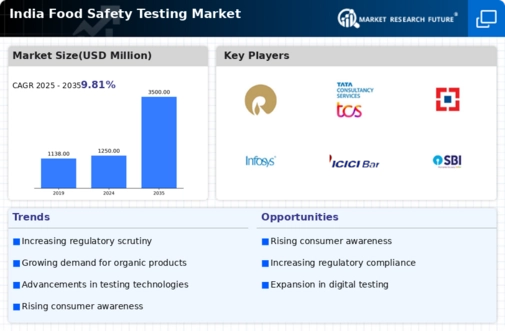The India Food Safety Testing Market is undergoing marked growth because of increasing consumer awareness and a higher incidence of foodborne diseases. With the advancement of food processing and the retail sector, there is an acute need for efficient food safety measures. The Government of India has a number of policies for ensuring food safety, including guidelines by FSSAI which require comprehensive testing to be performed. This support helps FSSAI compliance emerge as a primary driver for growth, encouraging the use of more testing services on a wide range of foods.
The food testing services India sector is gaining significant importance as regulatory standards tighten and consumer demand for safe, high-quality food products rises across the country. The food quality testing industry in India is expanding its capabilities to address a wide range of safety and compliance needs, including nutritional analysis, chemical residue detection, and quality assurance for domestic and export markets. Within this framework, microbiological food testing in India has become a critical focus area, helping manufacturers and regulators identify harmful pathogens and ensure that products meet stringent safety benchmarks. At the same time, the food contamination testing market in India is witnessing increasing adoption of advanced technologies and comprehensive testing protocols to detect contaminants such as toxins, adulterants, and allergens, reinforcing consumer confidence and enhancing the integrity of the food supply chain.
In the India Food Safety Testing Market there is great potential in the application of sophisticated systems like AI and blockchain which increase visibility and accountability within the food supply chains.
Additionally, the growth of e-commerce and online food ordering services have created a need for reliable food safety testing to maintain quality control, indicating increased demand for testing labs. Also, the increasing popularity of organic and health-oriented foods is creating a demand for some form of testing to prove that products are safe and compliant with health regulations. Recent trends indicate that there is a higher demand for customized food safety testing due to the increase in consumers concerned about their health. The emergence of food startups and innovations in food processing are also adding to this change.
Moreover, there is a growing shift in expectation concerning transparency and sustainability, which requires food companies to spend more on testing to earn the trust of the public.
There is a collaborative focus from the government and industries in India to enhance the food safety infrastructure, where food safety testing becomes integrated into the food ecosystem alongside public health and safety.

















